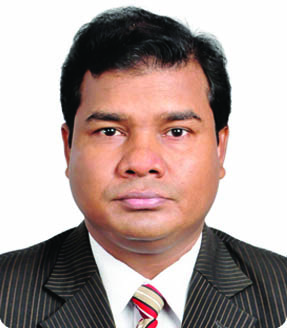Future of Bangladesh economy to be shaped by ethical leadership
Says Abul Fazal Mohamed Rubayat in an interview with Bangladesh Post

The future of Bangladesh’s economy will be shaped by ethical leadership—and Chartered Secretaries will be its architects, said Abul Fazal Mohamed Rubayat—Group Chief Corporate Affairs Officer & Group Company Secretary of IDLC Finance in an exclusive interview with Bangladesh Post.
He believes that that the technology will not replace governance professionals—but those who embrace technology will
lead them.
Abul Fazal Mohamed Rubayat, also the Council member and Chairman of the Education Committee at the Institute of Chartered Secretaries of Bangladesh (ICSB)—shares compelling insights into the transformative role of the Chartered Secretary (CS) profession in shaping a more ethical, transparent, and globally competitive Bangladesh.
With over two decades of leadership spanning finance, regulation, and governance, Mr. Rubayat offers a powerful vision for how the CS profession can empower organizations, uplift national integrity, and inspire a new generation of governance professionals grounded in ethics, strategy, and innovation.
The excerpt of his interview is produced for the valued readers of Bangladesh Post.
Bangladesh Post: Let’s begin with the basics—What is the Chartered Secretary profession, and why is it essential for Bangladesh?
Mohammad Rubayat: The Chartered Secretary (CS) is a globally respected governance professional—trained at the intersection of law, ethics, finance, sustainability, and corporate strategy. A CS is not simply a compliance officer or administrator. They are strategic governance leaders who design and uphold systems of transparency, ethical conduct, and long-term value creation.
Globally, the profession traces its roots to the UK in 1891, receiving its Royal Charter in 1902. In Bangladesh, this journey began with the formation of the Institute of Chartered Secretaries and Managers in 1997, culminating in the Chartered Secretaries Act, 2010,unanimously passed by parliament of Bangladesh, which gave birth to the statutory body we now know as ICSB.
In today’s Bangladesh, as transparency and trust increasingly define sustainable growth, the Chartered Secretary is not just relevant—they are essential.
Bangladesh Post: How do Chartered Secretaries contribute to Bangladesh’s economic development and corporate trust?
Mohammad Rubayat: Economic growth is not built on capital alone—it’s built on trust. Chartered Secretaries institutionalize that trust through strong governance frameworks, ethical leadership, and robust compliance systems.
In 2023, ICSB recognized over 40 organizations for exemplary governance practices—recognition that translated into tangible benefits: higher investor confidence, better financial performance, and stronger reputational capital.
Whether in listed companies, financial institutions, multinationals, or emerging startups, CS professionals are catalysts of ethical growth—ensuring that integrity becomes a competitive advantage.
Bangladesh Post: What sets a Chartered Secretary apart from a traditional Company Secretary?
Mohammad Rubayat: While a Company Secretary ensures regulatory compliance, a Chartered Secretary leads governance strategy. The difference is both in scope and substance.
A CS professional is trained not only in corporate law but also in: Boardroom advisory, ESG and sustainability reporting, Risk management, Corporate ethics, Cross-border governance frameworks, and Strategic digital transformation.
They shape board agendas, guide stakeholder communications, and align governance with long-term business goals. In short, they are the guardians of responsible capitalism in the modern era.
Advantages of Becoming a Chartered Secretary
• Global Recognition: ICSB’s CS qualification is respected worldwide.
• Career Versatility: Blend of legal, financial, ESG, and strategic expertise.
• Professional Development: CPDs, workshops, global seminars, and training.
• Leadership Opportunities: Advisory roles in the boardroom and beyond.
• Network and Community: Connect with senior leaders, regulators, and peers.
• High Ethical Standards: Promote a values-driven corporate culture.
• Positive Social Impact: CS professionals drive governance-led development.
“Pursuing the CS qualification is not just about earning a degree—it’s about joining a movement for ethical
leadership and corporate excellence.”
Bangladesh Post: What are the biggest challenges facing the profession in Bangladesh?
Mohammad Rubayat: The challenges are real—but so is the resolve.
• Public Awareness: There’s still limited understanding of the CS’s strategic value. This is changing, but faster advocacy is needed.
• Talent Pipeline: With just ~700 qualified professionals, Bangladesh must grow its CS community to meet future demand.
• Implementation of Standards: Secretarial standards and auditing must be uniformly applied and adopted nationwide.
• Digital Adaptation: Governance must evolve with AI, cybersecurity, e-board systems, and digital transformation.
• Regulatory Integration: CS roles should be legally mandated across more sectors—mirroring practices in advanced economies.
“Chartered Secretaries can be to governance what doctors are to public health—preventing crises before they happen.”
Bangladesh Post: What legal and regulatory frameworks must a CS master?
Mohammad Rubayat: A Chartered Secretary operates at the heart of a multidimensional legal ecosystem. Their knowledge spans across:
National Regulations:
• Companies Act, 1994
• Chartered Secretaries Act, 2010
• BSEC Rules and Corporate Governance Code (2018)
• Financial Reporting Act, 2015
• Bank Company Act & Finance Company Act
• Taxation Laws, Labor Law, Environmental Law
• Digital Security Act
Global Frameworks:
• OECD Corporate Governance Principles
• IFRS & GRI Reporting Standards
• UN SDGs
• Anti-Money Laundering (AML) and FATF Guidelines
This multidimensional expertise enables a CS to bridge regulatory rigor with ethical foresight.
Bangladesh Post: How is digital transformation reshaping the CS profession?
Mohammad Rubayat: We are transitioning from analog compliance to digital governance leadership.
At leading companies, we’re already integrating the paperless meeting management, AI-powered investor relations,real-time risk reporting, E-disclosures and ESG dashboards & cyber governance and digital ethics frameworks
CS professionals today must understand AI, blockchain, IoT, and advanced data security—not just as threats, but as tools for transformation.
Bangladesh Post: How is ICSB empowering the next generation of CS leaders?
Mohammad Rubayat: As Chair of the Education Committee, I am proud to share that ICSB is undergoing a complete transformation to make the CS qualification future-ready:
Academic & Infrastructure Reforms include Modernized syllabus aligned with global bodies (ICSI, CGI, CSIA), Modular e-learning & hybrid classrooms, Advanced library, digital tools, and ERP systems and Scholarship programs & crash courses
Learning & Leadership development include CPDs, workshops, and leadership boot camps, National mentorship and campus outreach and Special masterclasses from top industry figures
In building Global & Industry Partnerships it requires to sign MoUs with universities, regulators, and international institutes, Hosting governance summits & job fair participation and Career placement and faculty development
Our target is bold yet achievable: 10,000 students by 2030—ready to lead Bangladesh into a new era of governance.
Bangladesh Post : What are the long-term prospects of the CS profession in Bangladesh?
Mohammad Rubayat: The future of the Chartered Secretary (CS) profession in Bangladesh is not only promising—it is pivotal.
As Bangladesh sets its sights on becoming a trillion-dollar economy by 2041, good governance will be the compass that guides our growth. And the Chartered Secretary will be at the helm—ensuring ethical leadership, regulatory compliance, and strategic foresight in every sector.
The opportunities are accelerating across: 300,000+ registered companies under RJSC, 50,000+ DVC-enabled firms verifying transparency, 400+ listed companies under BSEC supervision, 100+ financial institutions including NBFIs and banks and Family businesses, conglomerates, startups, NGOs, and impact-driven enterprises.
Whether in corporate boardrooms, regulatory bodies, or civil society, CS professionals serve as custodians of trust. To the students of Bangladesh:, I must say if you aspire to combine intellect with impact, law with leadership, and strategy with service—this is your moment.
As part of ICSB’s Vision for Education Excellence (2025–2030), as Chairman of the Education Committee at ICSB, I am proud to share our bold educational roadmap, designed to develop Bangladesh’s next generation of governance professionals.



